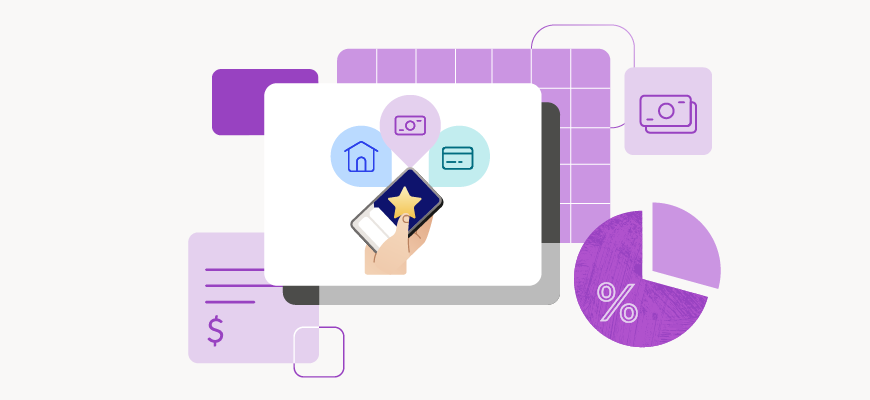If you’ve recently moved to Canada or are planning to soon, one thing you’ll have to do is establish credit. As a newcomer to Canada, you’ll be able to move your savings and other financial assets to a Canadian bank, but you won’t be able to transfer your credit history. That’s something you’ll have to build from the ground up.
Many new immigrants delay building credit because they don’t think it’s important, they’re wary of taking on debt, or simply because credit is an unfamiliar concept. The country you’re moving from may not have a national credit reporting system but, in Canada, it’s a vital part of your financial life. Having a strong credit history is how you’ll access credit cards, mortgages, car loans, personal loans and other financial products. It’s also frequently used by employers, landlords, and insurance agents as an indicator of financial responsibility and trustworthiness
Starting from scratch can be challenging but it’s completely doable. In this article, we’ll outline how credit works in Canada and give you 10 straightforward ways to start building yours.
How Does Credit Work in Canada?
Your credit history is a measure of how financially responsible you are. Potential lenders use this information to decide whether or not they want to give you a loan and on what terms. In Canada, you have both a credit report and a credit score.
Your credit report is a summary of your credit history. It’s created when you borrow money or apply for credit for the first time. It details your entire history of borrowing and repaying money within Canada. Canada has two credit bureaus, Equifax Canada and TransUnion, and they’ll both compile credit reports based on your credit history.
Your credit score is a three-digit number between 300-900 that comes from the information in your credit report. It indicates how well you manage credit and other financial commitments, and therefore how risky you are to lend money to. The higher your score the better.
You get points when you manage credit responsibly by doing things like making all your payments on time and in full. You lose points when you have trouble managing your credit and do things like miss payments or default on loans. Having a high score makes it easier (and cheaper!) to access financial products. You’ll have more options and be offered the best rates.
There are five factors that make up your credit score: credit inquiries, credit mix, credit history, credit utilization, and payment history. In general, people with a longer history of paying back their debt on time and in full have better credit scores. That’s why it’s important to start building your credit right away, even if you don’t think you’ll be applying for something like a mortgage in the near future.
Good credit gives you more options. By starting to build your credit now you’ll have more opportunities available to you in the future.
How to Build Credit in Canada as a New Immigrant
Now that we’ve reviewed how credit works in Canada and why it’s important, let's look at exactly what you can do to begin building yours.
Here are 10 practical ways to build your credit from scratch as a new immigrant:
1. Apply for a Credit Card for Newcomers
Using a credit card is one of the main ways to build credit. However, qualifying for a credit card without a previous credit history can be challenging. That’s because most credit cards are unsecured (they don’t require collateral) and are offered to you based on your current credit score and income. When you’re new to Canada, you won’t have a credit score and you may not have a high or consistent income.
Knowing this, many Canadian banks offer banking and credit products specifically designed for new immigrants. These newcomer banking packages usually offer low-cost or free chequing accounts, international money transfers, access to personal loans, and the ability to apply for a credit card without a credit history.
If you’re moving to Canada as a student there are tailored programs for you as well. They can be a great way to get started. Just be mindful of any promotional or introductory rates included in your package so that there are no surprises down the line.
2. Get a Secured Credit Card
If you’re unable to get a traditional, unsecured credit card, applying for a secured credit card is a great alternative. A secured credit card requires collateral in the form of a one-time security deposit when you open the account. This deposit acts as a guarantee for the lender. If you fail to make your monthly payments, they can simply apply that deposit toward your account.
Because these types of credit cards are backed by your own money, they’re much easier to qualify for and don’t tend to come with an income requirement. They do however tend to come with much higher interest rates, so be extremely careful that you make your payments on time and in full.
A secured credit card is a great way to both build your credit and practice healthy credit habits. It’s a stepping stone toward qualifying for an unsecured card with more favourable interest rates and additional benefits.
3. Get a Car Loan
If you need a car, getting a car loan to purchase one can be a good way to build your credit. It can also contribute to your credit mix by diversifying the types of credit you have in your name, which is a factor that boosts your credit score long-term.
Car loans are a form of installment credit. That means you’re given a lump sum of money upfront under the agreement that you’ll pay back the money over time (plus interest). Mortgages and student loans are other common forms of installment credit.
This is different than revolving credit, which is what a credit card is. With a credit card, you’re given access to a fixed amount of money under the expectation that you’ll pay back what you use each month. If you don’t, you’ll be charged interest. It’s called revolving credit because you have continuous access to it. If you have a $4000 credit limit and spend $1000 this month and pay it off, you’ll have access to that full $4000 again next month. With an installment loan, you don’t regain access to the money you pay off. The goal is to pay off the loan in full so that you fully own that asset (for example your car!) at the end of the loan term.
Having more than one type of credit can boost your credit score over time. Just be mindful to only take on loan payments you can afford. Have a clear budget before you go car shopping so you don’t get a bigger loan than you need.
4. Get a Monthly Cell Phone Plan
While cell phone plans aren’t a form of credit, many Canadian phone providers will report your monthly payments to the credit bureaus. This is another way you can display your ability to meet your financial commitments. Paying your phone bill on time and in full each month is an easy way to contribute to your credit-building efforts as a new immigrant.
Check with your cell phone provider to see if they will report your payment history to the credit bureaus. Some companies do this automatically while others will do this on request. Be mindful that this only works for monthly plans and not prepaid plans.
5. Make On-Time Payments Every Month
Your payment history is the largest factor that makes up your credit history. That’s why it’s vital to make on time payments every month if you want to build your score as quickly as possible. Missing payments hurts your score and gives lenders (as well as anyone else looking at your credit report like employers or landlords) the impression that you’re not financially responsible. This makes you look like a risky candidate in the eyes of lenders and will affect your access to high-quality financial products in the future.
It doesn’t matter how long you’ve lived in Canada, missing payments will negatively impact your score and limit your access to credit options in the future. Staying on top of your monthly payments and ensuring you’re not spending more than you can pay back is an important financial habit to establish. If you’re prone to forgetting, you can set up automatic payments from your chequing account every month.
It’s ideal to pay of your credit card or line of credit in full every month. If you can’t for whatever reason, make sure you’re at least making the minimum payment and making it on time.
6. Ask For Your Rent to Be Reported
Like your cell phone plan, your rent payments aren’t a form of credit. However, you can ask your landlord to report your rent payments to credit bureaus. Not all landlords will do this but some will. It’s worth asking as it’s an easy way to contribute to your credit building efforts without debt.
If your landlord won’t report your rent, there are a few programs that will report this information for you. Borrowell’s Rent Advantage is an easy way to have your rent payment reported automatically to Equifax Canada, so you can build your credit history with the rent payments you make every month anyway! There’s no hard credit checks required and it’s a simple way to build your credit when you’re starting out.
If you decide to do this, remember that being late on your rent payments will impact your score. Make sure you have a system in place to never forget to pay your rent on time every month!
7. Avoid Applying For Multiple Cards
It can be tempting to apply for multiple cards as a way to improve your credit. However, that’s not wise and can actually hurt your score. Most of the time when you apply for new credit the lender will do what’s called a hard check on your credit report. This temporarily lowers your score. Applying for multiple sources of new credit in a short time span can signal financial instability or desperation to lenders, even if this isn’t the case, and hurts your score.
Do you research before applying for a credit card so that you know which one is ideal for you and which one you’re most likely to get approved for. If you sign up for Borrowell’s free credit score service you’ll be able to see which cards are recommended for you based on your personal financial situation and your likelihood of being approved.
8. Avoid Overspending
Not spending more than you have is a basic financial habit to master. It’s easy to overspend with a credit card because unlike a debit card, you can spend money you don’t yet have. Overspending comes with consequences. It’s harder to pay your balance in full which can result in more money going to interest payments. Over time, you can get yourself into a dangerous spot financially where you can’t meet both your living expenses and your credit card payments.
Overspending can also reduce your credit score by increasing your credit utilization ratio. If you can’t pay off your card or you start missing payments, that will significantly impact your score.
Credit cards are an impactful way to build healthy credit over time by showing that you’re responsible enough to only spend what you can pay back. However, it’s only a responsible choice if you’re able to make the payments in full and on time. Making a clear monthly budget and treating your credit card like a debit card can help.
9. Check Your Credit Report Regularly
Your credit report is what’s used to calculate your credit score, so you want to make sure that the information on it is accurate! Get in the habit of reviewing it regularly. This allows you to spot any errors on your credit report, proactively spot early signs of identity theft, and understand how your financial behaviour is impacting your credit score. That way there will be no surprises when you need to pull your credit report to apply for credit, a job, or a rental unit.
Checking your credit report regularly with a free service like Borrowell will help you understand what’s negatively and positively impacting your score. With Borrowell’s credit coach, you’ll receive personalized tips on how to boost your score. Monitoring your credit report through Borrowell doesn’t harm your score, and you’ll get an updated credit score every week.
10. Dispute Any Errors on Your Credit Report
If you see any errors on your credit report, dispute them as soon as possible so they don’t impact your score. Look out for mistakes such as incorrect personal information, inaccurate payment history or account status, account balance errors, or sources of credit you didn’t open. You’re looking for any discrepancies between your actions and personal information and what’s been recorded on your report. Left unchecked, these errors can negatively impact your score in the long term.
The Bottom Line
Building credit is a process that takes time. While it may seem daunting at first, it’s an important part of setting yourself up for success in Canada. Start now and use these 10 practical actions to guide you. Be patient with yourself, maintain good financial habits, and keep things simple. Having good credit is worth it. It will increase the financial and lifestyle opportunities available to you as you settle into your new life in Canada.













